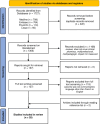The impact of using simulation-based learning to further develop communication skills of pharmacy students and pharmacists: a systematic review
- PMID: 39696320
- PMCID: PMC11654339
- DOI: 10.1186/s12909-024-06338-6
The impact of using simulation-based learning to further develop communication skills of pharmacy students and pharmacists: a systematic review
Abstract
Background: Effective communication in healthcare, among professionals and between professionals and patients is crucial for delivering high-quality care. While simulation effectively translates technical skills to clinical practice, its impact on communication, particularly in pharmacies, is less well documented.
Aim: This systematic review examined the impact of simulation-based education on communication skills among pharmacy students and pharmacists. It aims to identify the types of simulations used, the outcomes obtained, and the effectiveness of these simulations in enhancing communication skills, perception and confidence.
Method: We conducted searches in MEDLINE, LISSA, EMBASE, and PsycINFO for articles on communication training through simulation for pharmacy students and pharmacists. The search covered the period from inception to August 31, 2022. To be included, studies had to meet the following criteria: (i) target pharmacy student or graduate pharmacists; (ii) use simulation in the field of clinical pharmacy; (iii) provide a complete description of the outcome measure. Studies for which it was impossible to extract data specific to pharmacy students or simulation were excluded. Three investigators independently evaluated each title and abstract. If each investigator considered the citation eligible, six authors progressed to full-text review. The outcomes related to communication were categorized into three groups: perception of the importance of communication in delivering high-quality patient care, confidence in communication skills, and assessed communication proficiency. The quality of studies included in this review was assessed using the Mixed Methods Appraisal Tool (MMAT).
Results: The total number of participants was 3337. Among the 20 articles reviewed, which were primarily published in the United States over the last decade, only one focused on community pharmacists. Quasi experimental designs were predominant, and studies often relied on learners' self-assessments with non-validated questionnaires. Simulation-based learning aimed to enhance communication skills and attitudes across interprofessional contexts (involving nursing and medical students), patients, and families, frequently utilizing simulated patients. Studies evaluating outcomes have emphasized communication skills with patients and families, while those involving healthcare professionals often focused on perception of the importance of communication in delivering high-quality patient care.
Conclusion: Despite study heterogeneity, this systematic review concluded that simulation-based training significantly enhances perception, confidence, and communication skills. The development of clear guidelines and standardized assessment tools to evaluate communication would significantly improve the validity and reliability of future research efforts (PROSPERO registration: n°CRD42022371915).
Keywords: Clinical pharmacy; Communication; Learning; Simulation; Students.
© 2024. The Author(s).
Conflict of interest statement
Declarations. Ethics approval and consent to participate: Not applicable. Consent for publication: Not applicable. Competing interests: The authors declare no competing interests.
References
-
- Silverman J, Kurtz S, Draper J. Defining what to teach and learn: An overview of the communication skills curriculum. New York: Radcliffe Publishing Chapiter. 2013;1:7–21.
-
- Hepler CD. Clinical Pharmacy, Pharmaceutical Care, and the Quality of Drug Therapy. Pharmacotherapy: The Journal of Human Pharmacology and Drug Therapy. 2004;24(11):1491‑8. - PubMed
Publication types
MeSH terms
LinkOut - more resources
Full Text Sources


